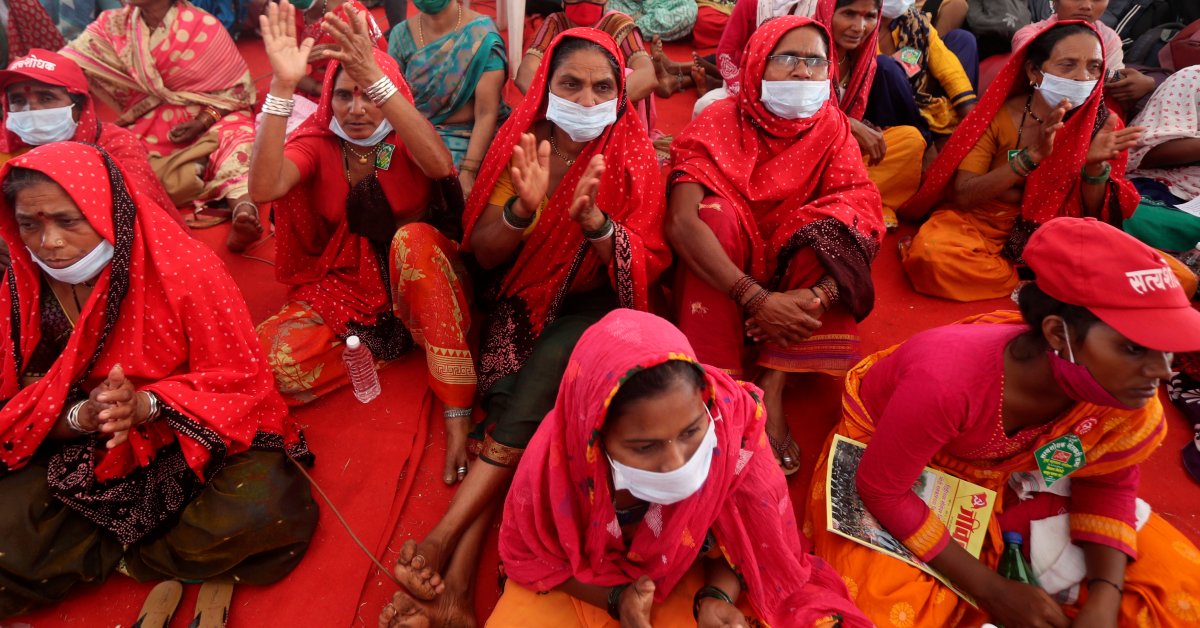[ad_1]
NEW DELHI — Tens of thousands of farmers drove a convoy of tractors into the Indian capital as the nation celebrated Republic Day on Tuesday in the backdrop of agricultural protests that have grown into a rebellion and rattled the government.
The capital’s roads were swarmed by rows upon rows of tractors bearing flags of India and farm unions. Farmers, wearing distinctive colorful turbans, shouted slogans against Prime Minister Narendra Modi and what they call his “black laws.†Thousands more marched on foot while dancing and singing, and at one place they were showered with flower petals by residents, some of whom recorded the unprecedented rally on their phones.
“We want to show Modi our strength,†said Satpal Singh, a farmer who marched into the capital on a tractor along with his family of five. “We will not surrender.â€
Police in riot gear used tear gas and water cannon at two places to push back the protesters who tried to knock down barricades. Authorities also parked large trucks to barricade multiple routes so that farmers don’t march to the interiors of the capital.
The farmer leaders said more than 10,000 tractors were to march through the capital for the rally and thousands of volunteers would try to help the police in keeping order.
The protests were set off by new agricultural laws Parliament passed in September. Modi’s government insists the laws will benefit farmers and boost production through private investment, but farmers fear cartelization and commercialization of agriculture will devastate their earnings.
Farmers first tried to march to New Delhi in November but were stopped by police. Since then, unfazed by overnight chilly winter temperatures they have hunkered down with food and fuel supplies and threatened to besiege the capital until the farm laws are repealed.
The government has offered to amend the laws and suspend their implementation for 18 months. But farmers insist they will settle for nothing less than a complete repeal. They plan a march by foot to the Indian Parliament on Feb. 1, when the country’s new budget will be presented.
The tractor rally overshadowed the Republic Day celebrations in New Delhi even as the annual military parade was scaled down because of the coronavirus pandemic.
A thin crowd assembled beside the ceremonial Rajpath boulevard in New Delhi to watch a display of the country’s military power and cultural diversity. People wore masks and adhered to social distancing as police and military battalions marched along the parade route. Several states displayed their floats to present their culture and the army showcased its latest equipment during the parade.
Republic Day marks the anniversary of the adoption of the country’s constitution on Jan. 26, 1950.
Farmers are the latest group to upset Modi’s image of imperturbable dominance in Indian politics.
Since returning to power for a second consecutive term, Modi’s government has been marked by several convulsions. The economy has tanked, social strife widened, protests have erupted against discriminatory laws and his government has been questioned over its response to the pandemic. In 2019, he brought together a coalition of diverse and disparate sets: minorities and majoritarians, rights activists and journalists, communists and socialists, students and teachers, including the once-dormant Opposition, to form a popular march against a contentious new citizenship law that discriminated against Muslims.
Now, in form of farmers, he is facing a growing rebellion from India’s most influential voting bloc.
Agriculture supports more than half of the country’s 1.4 billion people. But the economic clout of farmers has diminished over the last three decades. Once accounting for a third of India’s gross domestic product, farmers now account for only 15% of the country’s $2.9 trillion economy.
More than half of farmers are in debt, with 20,638 killing themselves in 2018 and 2019, according to official records.
The contentious legislation has exacerbated existing resentment from farmers, who have long been seen as the heart and soul of India but often complain of being ignored by the government.
Modi has tried to allay farmers’ fears by mostly dismissing their concerns and has repeatedly accused opposition parties of agitating them by spreading rumors. Some leaders of his party have called the farmers “anti-national,†a label often given to those who criticize Modi or his policies.
Devinder Sharma, an agriculture expert who has spent the last two decades campaigning for income equality for Indian farmers, said they were not only protesting the reforms but also “challenging the entire economic design of the country.â€
“The anger that you see is compounded anger,†Sharma said. “Inequality is growing in India and farmers are becoming poorer. Policy planners have failed to realize this and have sucked the income from the bottom to the top. The farmers are only demanding what is their right.â€
[ad_2]








